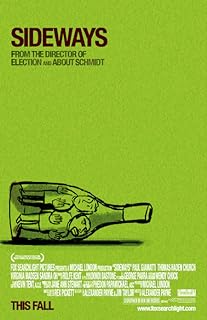電影訊息
電影評論更多影評

2008-06-26 23:22:07
The spectator of one's own life
Somewhere in his lackluster life, Miles' obsession with wine crossed the line from a connoisseur's passion into pure fetish. The conversation with Maya that night at Stephanie's house is pivotal and revealing. As he explained his affection of pinots, it became clear that to him, pinots is his projection of himself in the society, where he sinks lower and lower with every blow of frustration and indignity of reality day in and day out, all the while clinching to the beauty and meaning of life, to him wine and literature, like the last straw. It follows naturally that he snapped after getting the bad news from the publisher. That part of movie, though brief and predictable, is well done: full of tension but not over the top. By comparison, at the end he washed down the wine he's been saving for years (forgot what it is exactly) with burger and fries is too symbolic it falls to cliché.
The tragedy of Miles is that, he is a man with mediocre talent and way too much dignity in comparison. He spent his whole life writing a novel, essentially he wrote his whole life into the novel. Sadly, the novel, while no doubt beautiful and touching, is ultimately not enough to justify his whole existence. Jack tried to comfort him by saying, "so what they rejected you? Just write another one, with your talent, I'm sure you'll get published eventually." But to Miles that was a deadly blow, cause there could be no other ones, this IS the one, the one that Miles defined himself by, the one that allowed him to call himself a "writer", as opposed to a middle school English teacher who stole from his mother at the age of 40. And Jack, while initially came off as a swinger with a simpler thus stronger form of existence, actually have the same problem. He "had to" sleep with that waitress, the one near the end of the movie, not Stephanie, "it's something you don't understand", he told Miles. As an actor who is way past his prime, if a TV series can be called his prime and that's all he had to show for, rewarding random female fans with promiscuous sex is what made his life worthwhile, a duty he "had to" perform in exchange for the credibility to call himself a "star".
The movie is called "sideway", maybe in part to indicate the fact the characters are mere spectator of their lives, who kept their head in their respective pipedreams while dragging on their everyday duties with their exhausted body. It's a very nice touch when towards the end of movie a brief scene showed Miles sat listlessly in a classroom while a student read with a monotonous voice. All through the movie we see Miles as a agonized novelist, but the classroom scene was actually what Miles do everyday in his life, that was what really defined him, it was shown in the end of the movie as a reminder, as a reality check. Just like after a beautiful speech by Maya, just when you think something is gonna happen, the tension for romance that had been building up ever since Maya first showed up was about to be released, the tension was already exhausted, and Miles went into the bathroom sprinkling cold water on his face and cursed out the pretentiousness. Little touches like this are what makes this movie good. Speaking of which, Maya's speech about the reason she loves wine can serve as a perfect footnote to the "spectator" conception. The part she said how she imagined the life of grapes, under sunlight and rain, is very touching. Then she went on to say how she thought every bottle of wine is a living entity, how they live their lives ripening and waiting for the moment to be drunk. But wines are not living things, the fact a bottle of wine tastes differently one day from another is an inevitable consequence of chemical reaction, there is no objective purpose here. Spinoza said, the fundamental error of philosophy is to project human purpose and meaning onto the inevitable law of nature (his definition of God). Maya here, is speaking of not so much wine as her version of perfect life, how she saw herself going through life with purpose and dignity, aging with tranquility and grace, when she was on the verge of going into mid life as a divorced woman.
評論

